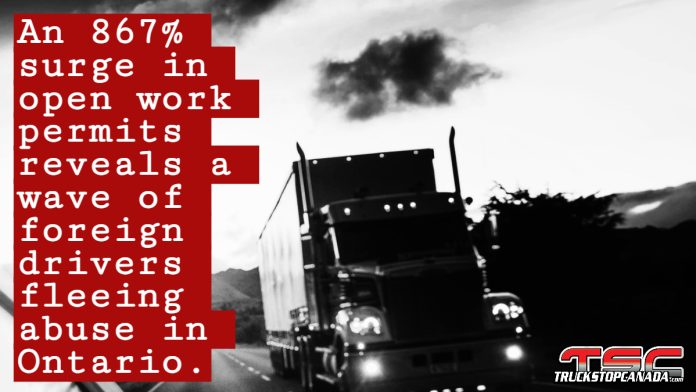Federal data reveals a growing concern in Canada’s trucking industry: a disproportionate number of violations under the Temporary Foreign Worker (TFW) Program originate from the sector itself.
Since 2020, over 80 violations involving trucking companies have been documented—accounting for more than 10% of all TFW-related infractions across all industries. Alarmingly, more than half of the fines issued to these companies remain unpaid.
Despite the severity of the penalties, many of the sanctioned companies continue to operate on Canadian roads. Due to the absence of a federal mechanism to automatically suspend a company’s operating license, these sanctions only restrict access to the TFW Program. As long as they comply with other applicable laws, companies can legally remain active—even if they’ve failed to pay fines or have a history of mistreating foreign workers.
Some companies have faced significant penalties. One Manitoba-based carrier was fined $258,000 and barred from the program for five years. In Ontario, Brampton-based Samhil Logistics was fined $100,000 and issued a ten-year exclusion.
Other carriers in Alberta and British Columbia have also accumulated numerous violations, mainly for failing to provide required documentation during inspections.
Ontario is not immune to this troubling trend. In addition to the companies already penalized, the Ontario Trucking Association (OTA) reports a sharp rise in open work permits granted to foreign drivers—often issued when workers attempt to flee abusive employers. Between January and March 2025, 435 such permits were issued, compared to just 45 during the same period in 2024—a staggering 867% increase. This surge points to a broader climate of distress among foreign drivers.
Stephen Laskowski, president of the Canadian Trucking Alliance (CTA), argues that the system is in urgent need of reform, not abandonment. He recommends a strict accreditation process for employers before they are allowed to recruit foreign workers, coupled with ongoing compliance audits. Repeat offenders, he says, should even lose their right to operate commercial vehicles in Canada.
Some companies—such as Eassons Transport, based in Nova Scotia—prove the system can work ethically. With about 70% of its drivers recruited internationally, Eassons handles the entire hiring process in the workers’ home countries, including interviews, road tests, and biometric data collection. The company has condemned the exploitative practices of intermediaries that charge workers up to $50,000 in fees that should be covered by the employer.
Industry leaders agree on the need for higher standards and stronger oversight. Pilot programs, like Nova Scotia’s initiative to certify trusted employers, could serve as a national model.
The goal is clear: to protect vulnerable workers from exploitation while maintaining a legal, reliable pathway to address the ongoing labour shortage in the trucking sector.
The current system is far too lenient. To truly protect foreign workers—and, by extension, preserve the integrity of Canada’s trucking industry—companies found guilty of serious abuse must face the harshest penalties, including the loss of their right to operate. After all, those exploiting the TFW Program are often the same ones misusing the Driver Inc. loophole, fuelling unfair competition across the transport sector.















